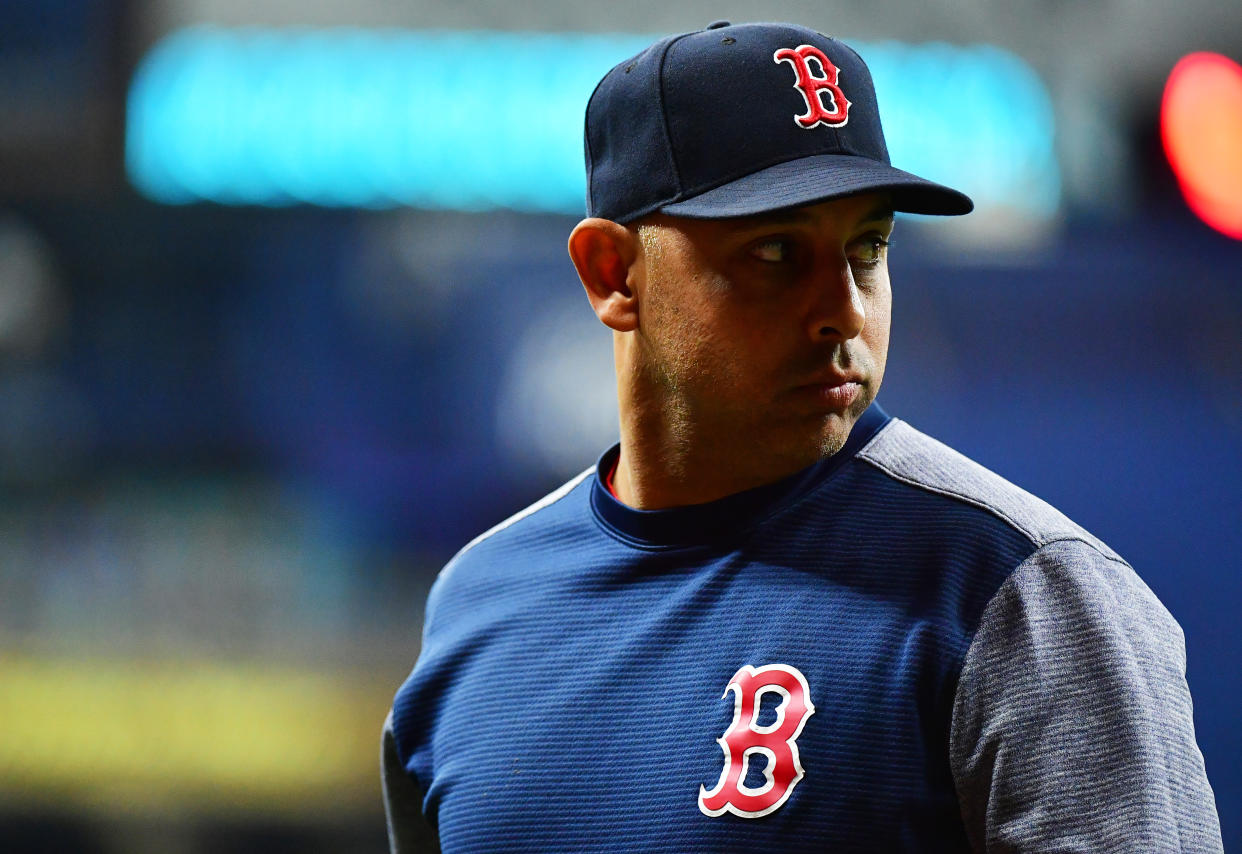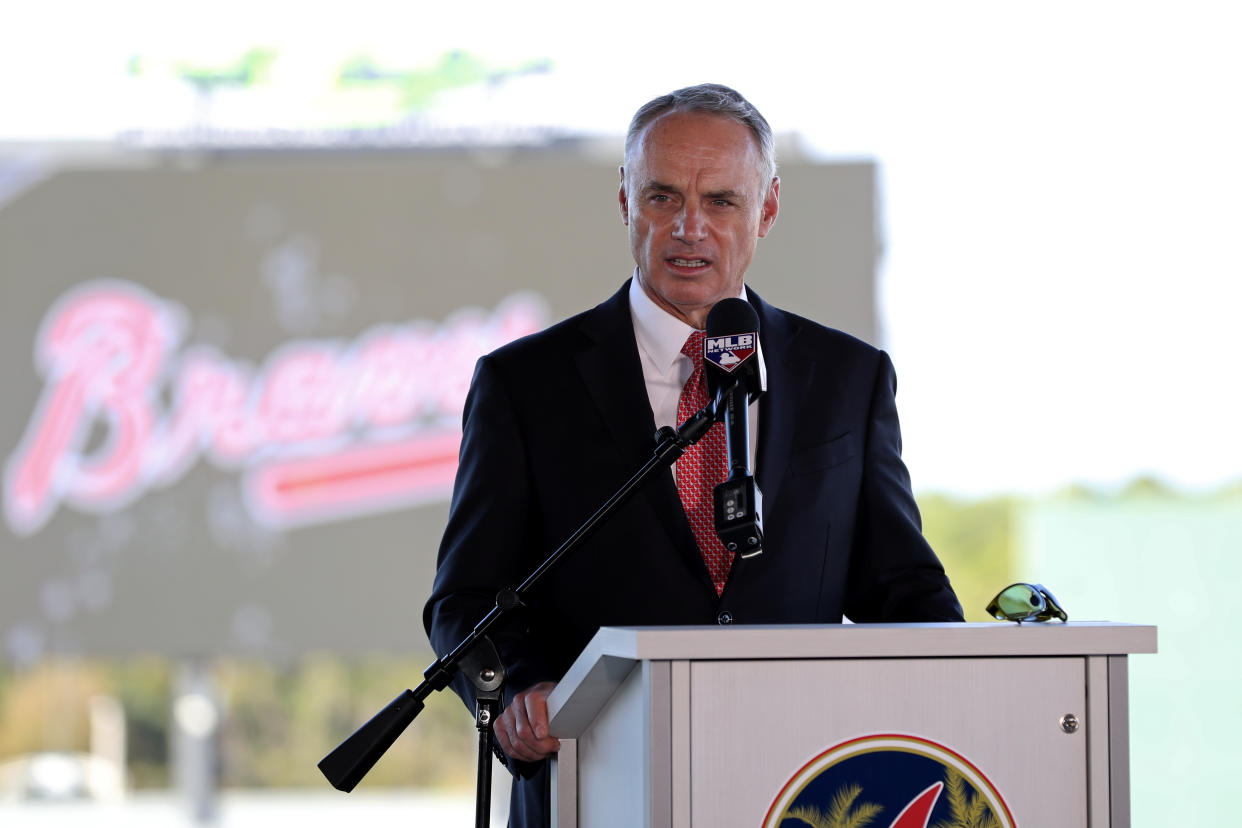MLB report: Red Sox sign-stealing 'far more limited in scope and impact' than Astros
Major League Baseball on Wednesday docked the Boston Red Sox their second-round draft pick and suspended a low-level team employee for systematically stealing catchers’ signs through technological means during the 2018 season, the second time in 2 ½ years the franchise has been disciplined by the commissioner’s office for similar infractions.
The investigation did not find evidence that the organization’s front office, manager Alex Cora or his coaching staff were aware of the actions of that employee — J.T. Watkins, who operated the club’s in-game replay system. Also, according to the investigation, the Red Sox scheme did not include direct communication between the dugout and the batter’s box (as in the case of the Houston Astros) and was limited to the 2018 regular season. The 15-page report called Watkins a “key participant” during a 2017 episode in which the Red Sox were found to have communicated with the replay room via an Apple watch.
Cora, who the Red Sox fired after MLB’s Astros report identified him as a key figure in that sign-stealing scheme, was suspended for the 2020 season, but only for his role in Houston.
No Red Sox players were disciplined or named in Wednesday’s report. While players were granted immunity in exchange for honest testimony, the report authored by commissioner Rob Manfred stated that based on information gathered across dozens of interviews and tens of thousands of electronic communications, the immunity was not a factor in its decision. That distinction was not made in a January report on the wrongdoings of the Astros.
“Although the Commissioner’s Office agreed not to discipline players who were truthful in their interviews,” the report said, “based on the findings of the investigation, this is not a case in which I would have otherwise considered imposing discipline on players.”

Three months after MLB concluded its investigation into electronic sign stealing by the Houston Astros, an outcome that docked the Astros four draft picks, fined them $5 million and led to the firing of the club’s general manager and manager, Manfred handed down a report on a Red Sox scheme that surfaced shortly after the initial Astros allegations. Cora’s punishment was not officially announced until Wednesday’s Red Sox report.
On Wednesday night, Cora released a statement on MLB’s findings to ESPN.
Statement from Alex Cora, as provided to @ESPN pic.twitter.com/lpQWjXCoL0
— Marly Rivera (@MarlyRiveraESPN) April 23, 2020
The Red Sox hired bench coach Ron Roenicke as “interim” manager to replace Cora, then reportedly removed the interim tag on Wednesday when he was not implicated in the report.
The league determined that the Red Sox scheme resulted in part because Watkins was tasked with both scouting and decoding opponents’ signs and working as video replay system operator. Watkins, according to the report, denied using the replay system to decode signs in real time. Investigators determined, however, that Watkins used the system to update pitcher-catcher sign sequences that no longer aligned with his pre-game scouting. He’d then forward the new sequences to players. Watkins claimed the information came from players who’d been on second base and decoded the signs and sequences themselves.
Watkins was suspended without pay through the 2020 postseason and barred from working as replay room operator through 2021.
Red Sox president Sam Kennedy issued a statement following the report’s release:
As an organization, we strive for 100% compliance with the rules. MLB’s investigation concluded that in isolated instances during the 2018 regular season, sign sequences were decoded through the use of live game video rather than through permissible means.
MLB acknowledged the front office’s extensive efforts to communicate and enforce the rules and concluded that Alex Cora, the coaching staff, and most of the players did not engage in, nor were they aware of, any violations. Regardless, these rule violations are unacceptable. We apologize to our fans and Major League Baseball, and accept the Commissioner’s ruling.
The Apple Watch incident
In September 2017, the Red Sox were fined an undisclosed amount by the league office for using an Apple Watch to aid in a system that viewed, decoded and relayed to the dugout catchers’ signs. Stealing signs is not illegal unless obtained by electronic means. At that time, Manfred warned that future instances of technology-driven cheating, “[W]ill be subject to more serious sanctions, including the possible loss of draft picks.”
He also concluded, “I have received absolute assurances from the Red Sox that there will be no future violations of this type.”
Several months later, according to the commissioner’s most recent report, the Red Sox continued to use video and television feeds to gain an advantage against opposing pitchers. In October of that season, they beat the Los Angeles Dodgers in five games to capture the franchise’s ninth World Series title.
Manfred appears to be in a fight to protect the game from widespread abuses of delayed and live television feeds. In spite of his warnings and increased security, particularly in replay rooms, in the past two years, it seems clear major league players and staffs had discovered blind spots in the system.

He was criticized in some circles for failing to punish Astros players who had devised and employed their system, which included a television monitor set up just outside the dugout and the banging of a trash can. Players were granted immunity during the league’s investigation in exchange for their cooperation. The discipline — general manager Jeff Luhnow was suspended for a year, manager A.J. Hinch for a season, and the loss of first- and second-round picks in the next two drafts — was characterized as heavy on the organization and light, or non-existent, on the players.
His decisions would set precedent for future violations. Beyond that, Manfred is said to be considering further safeguards in clubhouses, video rooms, replay rooms and dugouts, as well as technological solutions that would change how pitchers and catchers communicate.
Tumultuous time in Boston
The Red Sox sanctions come amidst a tumultuous several months for the franchise. The Red Sox fired president of baseball operations Dave Dombrowski in the second week of September, not a year after the latest World Series parade in Boston.
The club’s run of three consecutive AL East championships ended weeks later, in third place and out of the postseason for the first time since 2015. Chaim Bloom, a high-level baseball operations executive for the Tampa Bay Rays, was hired at the end of October and, by appearances, given orders to trim the Red Sox’s league-leading $244-million payroll.
Owner John Henry explained that the payroll lightening was more a goal than a mandate, given the club had routinely run north of the competitive balance tax threshold. By the first week in February, however, the Red Sox had traded their best player, Mookie Betts, and their most expensive player, David Price, to the Los Angeles Dodgers, a move that was likely to make the club less competitive and also less expensive.
MLB had hoped to conclude its investigation into the Red Sox much earlier, first by the start of spring training and then by opening day. Its focus, instead, became the advancing coronavirus, which required the shuttering of spring training and an indefinite postponement of regular-season games.
More from Yahoo Sports:
